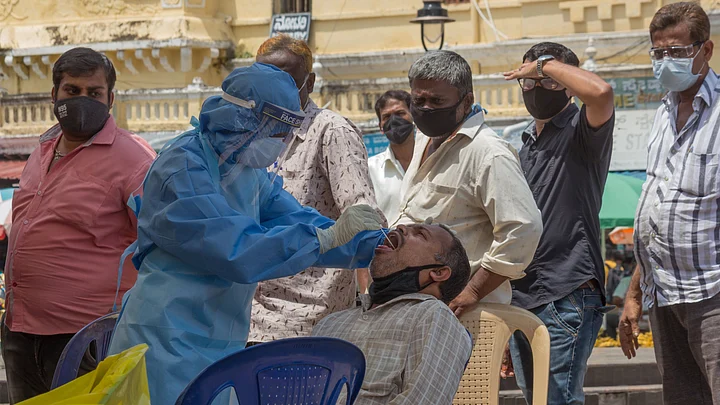The Indian SARS-CoV-2 Genomics Consortium (INSACOG), on Sunday, 22 May, confirmed that they have detected India's first cases of BA.4 Omicron subvariant.
While one case was detected in a South African traveller in Hyderabad, in another case, a 19 year old woman in Tamil Nadu was found to be infected with BA.4, according to the press release issued by INSACOG.
According to the consortium, the BA.5 variant was also detected in an 80 year old man from Telangana. The man is said to have mild symptoms, and is fully vaccinated.
"Contact tracing of the BA.4 and BA.5 patients is being undertaken as a precautionary measure,"read the press release.
BA.4 and BA.5, like BA.1 and BA.2, are sublineages of Omicron COVID variant, and are not classified as a separate variant.
According to the WHO, all subvariants collectively fall under the larger umbrella of the Omicron variant. This means that they shall be treated as variants of concern.
COVID cases in India have seen a slight dip after a few weeks of sporadic surges in some parts of the country. INSACOG has said that they will continue to monitor and look out for new variants through genome sequencing.
What Do We Know About BA.4
The BA.4 subvariant of Omicron was first detected in South Africa in January this year. Along with BA.5, it is said to be the driving forces behind South Africa's current COVID wave.
BA.4, according to the European Centre for Disease Prevention and Control (ECDPC), has changes in antigenic properties compared to BA.1 and BA.2, and is said to be more infectious than its predecessors.
According to the World Health Organization (WHO), Alteast 700 cases of BA.4 have been detected in over 16 countries, including the US, UK, Israel, Spain, and Pakistan, so far.
WHO's COVID lead Maria Van Kerkhove also added that although BA.2 remains the dominant variant in most of these countries, BA.4 is likely to take over eventually.
One reason for this could be that they are able to circumvent immune protection like other Omicron subvariants.
So, vaccines or prior infection, even with the Omicron variant, will not guarantee immunity against BA.4 and BA.5 subvariants.
However, experts also reiterate that the vaccines continue to provide good protection against severe illness and deaths.
There is also no evidence that BA.4, or even BA.5, for that matter, cause more severe illness than previous variants.
The WHO has emphasized that COVID variants are not done mutating just yet, and have asked governments to keep a close watch on new emerging variants.
(At The Quint, we question everything. Play an active role in shaping our journalism by becoming a member today.)
